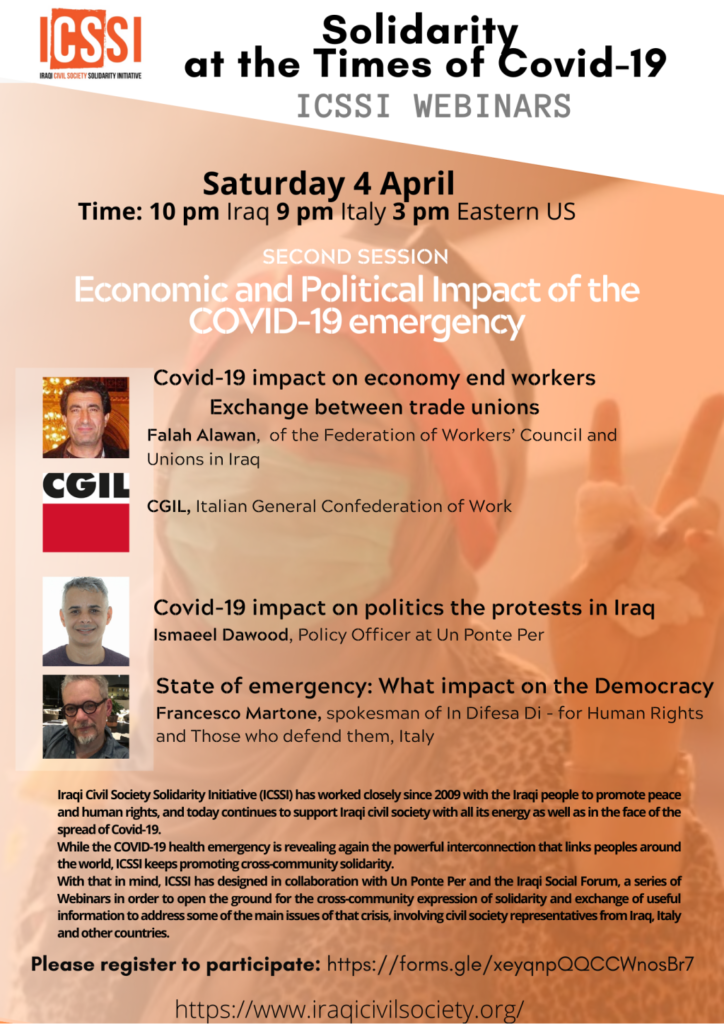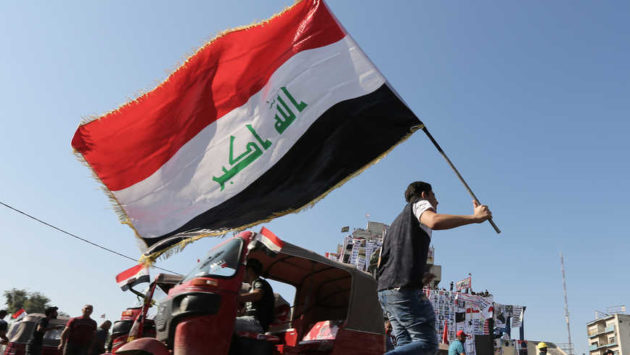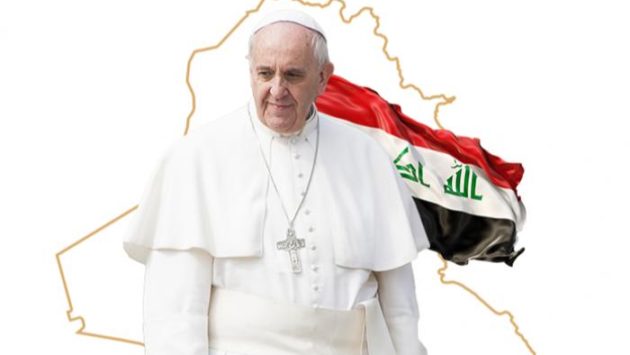Economic and Political Impacts of the COVID-19 Pandemic
Beyond the unprecedented challenges to their healthcare systems, nations also face extraordinary economic and political impacts from the COVID-19 pandemic. People are losing their jobs and struggling to provide for their families. Some governments are using the crisis to justify suppression of political protests and to curtail human rights. At the same time, the pandemic has provided a moment for us to collectively reimagine how our economic and political systems can better ensure the prosperity, security, and freedoms of all citizens. By looking at the vital roles that trade union members, civil society activists and human rights defenders are playing in Iraq and Italy, participants in the ICSSI’s second webinar on COVID-19, were inspired to see that we have an opportunity to develop the understanding and insight required to address other global challenges. This crisis can motivate us to appreciate the importance of solidarity with everyone in our local communities, our countries, and our world.

Our economic and political experts were:
- Falah Alwan, Chairman of the Federation of Workers’ Council and Unions in Iraq
- Silvana Cappuccio, Officer at the international policy department of Italian General Confederation of Work (CGIL), and member of the board of directors at the International Labour Organization (ILO)
- Ismaeel Dawood, Civil Society Officer at Un Ponte Per
- Francesco Martone, spokesman of In Difesa Di – for Human Rights and Those Who Defend Them, Italy
They turned first to peoples’ economic needs.
The Challenges for Unions and Workers
Falah Alwan described Iraq’s current economic crisis as having its roots in the 2003 U.S. invasion of Iraq that led to a huge loss of jobs and the destruction of vital infrastructure, including the nation’s health care system. Today eight million Iraqis work in unstable and unprotected jobs like driving taxis or selling goods on the streets. Many of them live below the poverty level. With curfews recently instituted, in keeping with WHO guidelines, these people lost their jobs. Since the curfews were imposed, there have been two public protests by the unemployed demanding government aid, but nothing has been done for them. Now with the drop in oil prices, the government cannot even pay its own employees, let alone help others. Funding for the health care system has been inadequate for years; some cities with populations as large as two million people have no clinic or hospital. Mr. Alwan predicted that Iraq is headed for a devastating COVID-19 crisis.
Silvana Cappuccio described how the trade unions have been able to mitigate some of the economic impacts of COVID-19 in Italy. Following the shut down in early March, at first some factories remained open. Workers feared for their health. The unions, the employers, and the government then held negotiations on what were “non-essential” businesses, which employers had resisted; the government provided funding to protect workers’ income. It also made 400 million Euros available for food vouchers for those with no resources. But much remains to be done to provide for the most vulnerable, for example domestic and home care workers, migrant farm workers, and other day workers. Also, Ms. Cappuccio expressed concern that there has been discrimination against migrants and the homeless in distributing food vouchers. Italy also needs to reclaim its public health care system; this epidemic has revealed how shortsighted 20 years of privatization was. The goal of public policies should be to protect people, especially the most vulnerable, she concluded.
Implications for Politics, Democracy and Human Rights
The epidemic is creating political crisis everywhere, because the virus respects no frontiers, but Ismaeel Dawood began, Iraq is in many ways a special case. The epidemic arrived following a months-long, youth-led uprising that aimed to reform the Iraqi political system. The focus of those protests was exactly on the government’s failure to provide vital services, especially on the inadequacies of the health care and education systems. Moreover, the protesters had argued, the militarization of the state and sectarianism was preventing the Iraqi government from meeting its citizens’ needs.
While the large and sustained protests shocked the political system, they did not achieve their goals before the Coronavirus arrived. The Prime Minister Abdul-Mahdi did resign and the politicians had been rethinking how to hold elections and form a new government. Indeed, on the day of the webinar, Adnan al-Zurfi, the prime minister designate, had just presented his plan for a future government to the Iraqi parliament, whether it will succeed is unclear. All these crucial decisions are being made in the context of escalating U.S.-Iran conflict, much of which occurs on Iraqi soil—bombings and proxy fighting as Iraqi militias allied with Iran are provoked by the U.S. Already there are criticisms by these Iran-backed forces that Al-Zurfi is a candidate of the U.S. government. Mr. Dawood described three possible scenarios: Al-Zurfi’s plan is passed, the plan is rejected and another is proposed, or the temporary government continues for years, further destabilizing Iraq.
Meanwhile, the far-reaching, political reforms demanded by the student-led uprising have been set aside because of the Coronavirus. At first, there was tension among the protesters. Some felt that if they left the protest squares, they would lose all that they had struggled for. Others argued they needed to recognize the serious risks of the epidemic and respect the rule of law and the government call for a lockdown. Now is the time, Mr. Dawood insisted, to find new forms of political struggle, because the reforms the protesters envisioned are crucial to Iraq’s ability to meet its people’s needs, which will grow greater as the epidemic intensifies.
Francesco Martone focused on the human rights impacts of the epidemic, as they are emerging in Italy and throughout the world. He reminded listeners that the Coronavirus emerged against a backdrop of increasing authoritarian regimes worldwide and shrinking space for civil society. Now, four billion people across the planet are staying at home; it is an unprecedented limitation of our public space. At the same time, Mr. Martone argued, the crisis can be an entry point for a new future, an opportunity to analyze the forces that reduce our fundamental rights and be creative about holding our governments accountable. Above all, he insisted, we must insure that emergency restrictions do not become permanent. We need more independent bodies that can actively monitor government practices, keep the public informed, and analyze new issues as they emerge, such as the need to protect people in detention where social distancing is impossible. Webinars like this one are vital because we need to constantly exchange information in order to protect democratic institutions, and insure that restrictions that are neither too extreme nor too long lasting. Mr. Martone shared several resources to help webinar participants explore these issues further:
ICNL- The International Center For Not-For-Profit law
Human rights watch – Human Rights Dimensions of COVID-19 Response
Ali Saheb, the Coordinator of the Iraqi Social Forum, then spoke. He reiterated that the people of Iraq are facing dire circumstances. Jobs in the private and the public sectors have been cut. People are literally risking their lives and those of their family members, to keep grocery stores and bakeries open without the necessary PPEs. People face a bitter choice: dying of hunger or dying from the virus, and government plans to address these needs are non-existent.
Ismaeel Dawood left the webinar participants with a plea to learn from COVID-19, so that we emerge from the pandemic prepared to address other global challenges. The forces dominating the planet today—global capitalism, environmental degradation and climate change—are not sustainable, he said. We need each other and this is the time to develop alternatives and learn to connect our movements worldwide.




